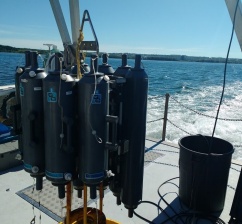Bedford Basin Time Series
Background of Dalhousie's Bedford Basin Time Series
The Dalhousie component of the Bedford Basin Time Series (BBTS) began in 2008 when Dr. John Cullen’s group at Dalhousie deployed a buoy in Bedford Basin in collaboration with the Bedford Institute of Oceanography (BIO). The buoy required weekly sampling for calibration and validation purposes, mainly for bio-optical and phytoplankton ecology research. Although the buoy did not remain in the water for a long time due to ship traffic issues, the weekly sampling continued to this day.
Bedford Basin provides not only a convenient location for research, but also is a proxy for conditions on the Scotian Shelf. The initial focus on weekly bio-optical properties has expanded over time, adding a variety of water samples analyses due to an expanding interest from several Dalhousie research groups. A regular sampling series of this size and with such a variety of data is invaluable in monitoring environmental fluctuations over time and helpful in modelling and forecasting.
The program is coordinated by Dalhousie’s CEOTR group and is funded by MEOPAR and the Ocean Frontier Institute. The weekly Wednesday cruises take place onboard Coast Guard vessel Sigma T as part of the Bedford Basin Monitoring Program operated by BIO. The regular sampling team consists of two CEOTR and one DFO field technician. Samples are collected for numerous Dalhousie research groups, including Doug Wallace’s CERC.OCEAN lab, Julie Laroche’s Marine Microbial Lab, Hugh MacIntyre’s Phytoplankton Lab, and the Dalhousie Aquatron group. Other Dalhousie research groups also work on the Bedford Basin associated with our program, including Christopher Algar's Microbial Biogeochemistry Lab and Jong Sung Kim's Health and Environments Research Centre (HERC) Lab.


